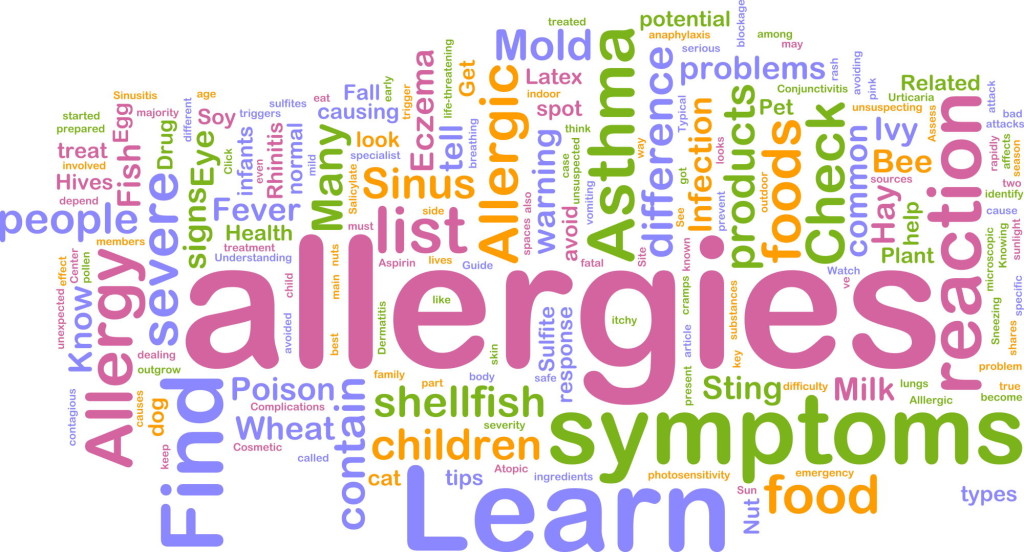 Allergic reactions occur being an immune response of the body to an international substance. Once the allergic reaction is because of a drug, old or new, it is stated to become a drug allergy. Adverse medication reactions may appear with any course of drugs, but way more in the event of antibiotics accompanied by anti-tumor drugs.
Allergic reactions occur being an immune response of the body to an international substance. Once the allergic reaction is because of a drug, old or new, it is stated to become a drug allergy. Adverse medication reactions may appear with any course of drugs, but way more in the event of antibiotics accompanied by anti-tumor drugs.
Symptoms
Outward indications of drug allergy will be the same exact for any kind of allergy. Frequently occurring ones are pores and skin rash, hives, and itching of the eyes or skin. These are not so serious symptoms. These reactions are treated by substituting the existing drug with another usually.
However, severe reactions right after getting the medication include tightening or swelling of the airways, lightheadedness or dizziness, rapid pulse, or loss of consciousness even. Seek emergency therapy since they are anaphylactic symptoms which are life threatening potentially.
Risk and causes factors
Everyone and anyone could be allergic to 1 or another drug. Generally children and center aged folks are more prone to medication allergy than others. Female gender is a risk factor for allergies to a drug also. You may have an allergic attack if also
·you have a previous allergic attack to any drug
·you are usually allergic to penicillin you might be allergic to another antibiotics as well
·you have a new weakened disease fighting capability as in AIDS /HIV
·you have a brief history of other allergies
·you have asthma, high blood heart or pressure disease.
Types
You could have an allergic attack to any drug. However, many are more typical than others. Here’s a listing of the most typical drug allergies.
·Penicillin and associated antibiotics such as for example cephalosporins, sulfonamides (sulpha medicines), and aminoglycosides will be the most common reason behind drug allergies. Nevertheless, the different courses of antibiotics vary according of these mechanism of activities and adverse effects.
·Anticonvulsants such as for example carbamazepine, lithium salts, divalproex sodium, oxcarbazepine, among others utilized for seizures along with other mental illnesses could cause allergic reactions.
·Insulin, animal resources of insulin especially, is a common exemplory case of drug allergic reactions.
·Radiocontrast brokers or X-ray comparison dyes containing iodinecan furthermore cause allergies. Sometimes, they are able to cause anaphylactic reactions which can be existence threatening. The incidence of reactions is apparently lower with nonionic agents in comparison with ionic agents. Oral corticosteroids and H1-antihistamines are used to treat such allergies generally.
·Sulpha drugs, another typical reason behind drug allergy, could be both antibiotic and also non-antibiotic. You could have an allergic attack to either or both these groups. Sulfonamides antibiotics tend to be associated with more serious drug responses such as for example Stevens-Johnson syndrome (SJS) and toxic epidermal necrolysis (10) seen as a fever and considerable necrosis (premature cell dying). People who have HIV are usually at an increased threat of sulphonamide allergy. nonantibiotic sulpha medicines such as for example acetazolamide, frusemide, hydrochlorothiazide, chlopropramide, sulfasalazine, dapsone, etc, are usually less inclined to cause severe allergies.
·Aspirin and non-steroidal anti-inflammatory drugs, too could cause allergy in a few people. ‘If you possess an aspirin sensitivity or allergy, you may even have a reaction to non-steroidal anti-inflammatory medicines (NSAIDs), like ibuprofen (Advil, Motrin IB, others) and naproxen (Aleve, others)’, states Mayo Clinic allergy and asthma professional James T C Li. The allergy can range between mild to serious and the reaction may appear within a few hrs of taking the medicine.
·Vaccines have already been found to trigger allergic reactions in a few people. Serum illness is a delayed kind of drug allergy occurring a week or even more after you face a medicine or vaccine.
Diagnosis
It is extremely difficult to recognize a drug allergy. Which is because there are usually hardly any good laboratory drug and penicillin testing which can be useful in diagnosing them. What goes on is, usually the original type of medication will not cause the allergic attack. It's the modified type of the medication or the metabolite of the medication that the disease fighting capability responds to. However, your skin check for penicillin is quite effective because all the essential metabolites of penicillin have already been identified. So much therefore, the test can properly identify not only who's allergic to penicillin but additionally who is not really allergic. There are some tests to diagnose medication allergy and included in these are -
Blood test - Allergy for some antibiotics, muscle relaxants and insulin could be diagnosed through blood check.
Skin test - Skin check may be necessary for certain antibiotics. Handful of the medication is injected in to the pores and skin. If you’re allergic to the medication being tested, you shall develop a reaction.
Drug provocation check - This check is resorted to once the other two tests are usually inconclusive. In this check, you may be given gradually increasing dosages of the offending medication. When there is a response, sensitivity to the medication is indicated; or even, then maybe it's considered a safe therapy option.
Since tests or skin tests aren't helpful always, allergists have to be determined by an in depth and accurate background of all your present and past medication to recognize which medication is responsible.

